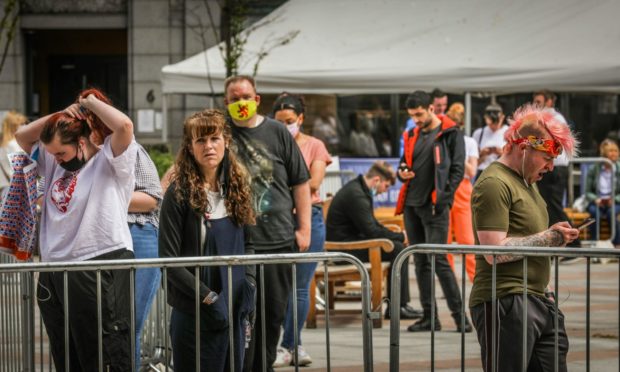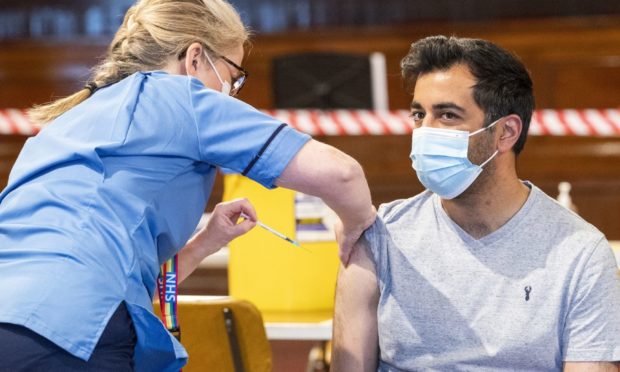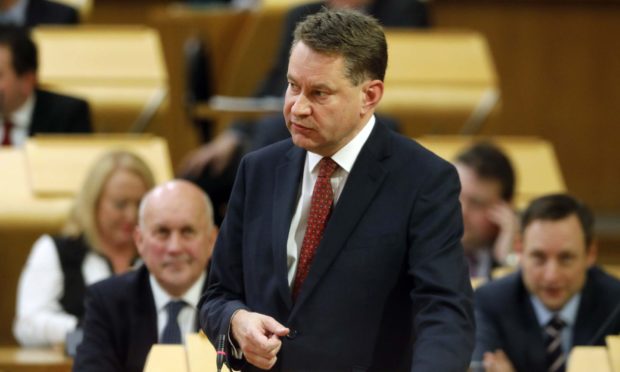Scotland’s health secretary remains “sceptical” about using Covid passports as a way of forcing younger Scots to get their shots.
Humza Yousaf talked down the proposal after concerns were raise about a 30% gap in uptake of the first jab among people aged 18 to 30.
The UK Government – under fire for rushing out of lockdown – is now planning a scheme which could force people to prove they were vaccinated to gain entry to places such as nightclubs.
Tories in Scotland think the plan would be “reasonable” to consider north of the border.
Mr Yousaf, on BBC Radio Scotland, said vaccinations are not mandatory and he is “instinctively sceptical” about imposing passports in Scotland.
Instead, he is still considering direct approaches to younger people to encourage greater uptake of the potentially life-saving injections.
“We’re going to football matches, pre-match, working with football clubs to encourage people,” he said.
“We’re going out to shopping centres, to high streets, where hopefully young people are.”
The SNP government is also asking health boards across Scotland to get mobile units to places likely to reach younger people.
Asked if passports would help, Mr Yousaf said: “I’m naturally and instinctively sceptical about Covid passports for reasons that have been well articulated.
“One of the first meetings I had as cabinet secretary for health was with human rights groups and organisations and they were vehemently opposed to Covid vaccine passports, because they were concerned about the fact they might increase the inequality gap, that there would be ethical issues.
“I’ll give you one example – we know that uptake of vaccines has been lower in the African and Polish communities. Therefore, would it be correct and right to deny entry where some groups may be more disproportionately affected than others?”
‘Not swithering’
More than a year after the first discussion on passports, Mr Yousaf said the government is “not swithering” on taking a decision.
“I’d prefer positive incentive as opposed to negative,” he added.
Date from Public Health Scotland shows around 30% of 18 to 29-year-olds and 20% of 30 to 39-year-olds in Scotland have not had a first dose of a coronavirus vaccine despite every adult being offered a first appointment.
Mid Scotland and Fife MSP Murdo Fraser, the Conserviative Covid recovery spokesman, said the country is not making progress fast enough.
Speaking earlier, he said: “If we’re going to defeat this virus we need to get the population vaccinated and 18 to 29-year-olds are the key group now.
“What we’ve seen is quite an alarming decline in the numbers being vaccinated.
“On Monday the daily first doses of the vaccine hit a three-month low, only 2,483 people were vaccinated with a first dose on Monday, so we are really struggling to meet this key group.”
The previous Monday saw 7,163 first doses administered.
Mr Fraser said requiring a vaccine passport or proof of a negative test to attend large-scale events like nightclubs or concerts is a “reasonable proposition”, adding: “I think that is a reasonable trade-off for people.”
Orkney and Shetland MP Alistair Carmichael, currently standing in as leader of the Scottish Liberal Democrats, heavily criticised the ideas as “probably one of the most pointless and divisive exercises you can imagine”.
He said: “They will leave behind those who are not vaccinated for good reason or otherwise.
“If you have got everyone vaccinated then, frankly, you wonder whether it would be worth the expense and hassle.
“To threaten people in order to get the vaccine I think is the wrong approach altogether and I think it would be massively divisive.”
What are the latest vaccine statistics?
The latest official figuresshow 69.6% of 18 to 29-year-olds have had a first jab, while 80.8% of people in their 30s have had one.
The figure for first doses for people in their 40s is 89.6%, while the proportion of that age group which is double-jabbed is 68.9%.
Overall, 3,984,433 adults in Scotland has had their first dose, equivalent to 89.3% of all over-18s, PHS figures published on Tuesday show.
Some 2,995,086 people have had both doses, covering 67.3% of adults in the country.
The figures include a small number of 16- and 17-year-olds in specific priority groups.


